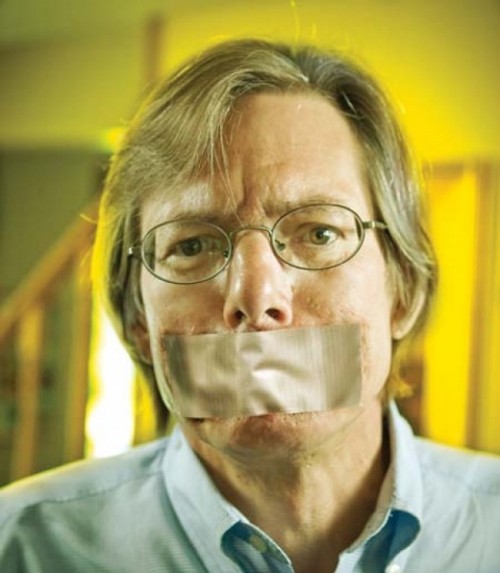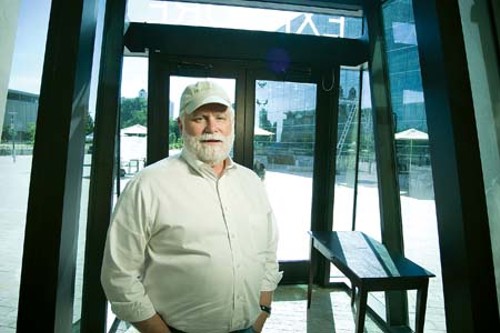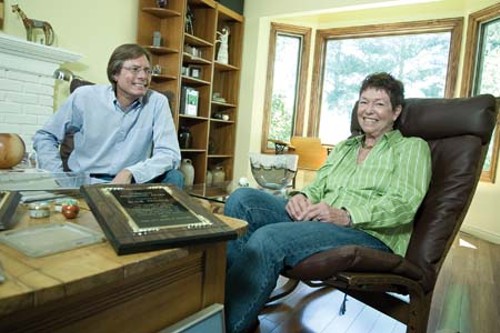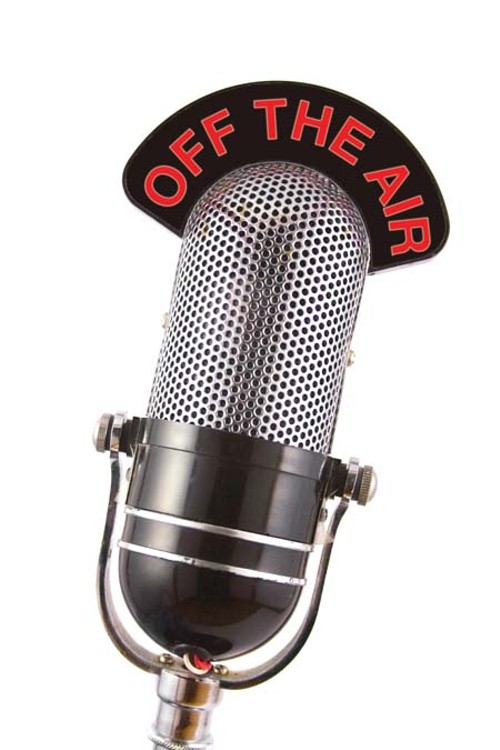Radio Silence
After a long quiet year, Park City public- radio magnate Blair Feulner phones home.
By Wren AbbottIt was 1968 and public radio mogul-to-be Blair Feulner,
then 16, was no longer welcome at Olympus High
School. He had upset the principal by reporting on
a sex scandal between two members of student government
in the underground newspaper he began
putting out that year—and ended up heading to the
University of Utah a year early after Olympus kicked
him out.
“They were gonna get rid of me, and I said, ‘I don’t
think you can do that. There’s such a thing as the
First Amendment,’” Feulner said.
Fast-forward to July 15, 2008. A staffer for KPCW
91.9 FM, the Park City public radio station Feulner
founded in 1980, was walking into the station just as
Feulner was walking out. Feulner had just made an
announcement that stunned the station staff and listening
audience: He was leaving KPCW on sabbatical
and might or might not return.
The staffer asked Feulner, “Well, what does that
mean?”
“He just said something like, ‘That’s my last time on the air,’” former KPCW general manager Tina Quayle said. “Everybody’s mouths were just simply hanging open.”
It had been a tense few months around KPCW.
Feulner had been negotiating his employment contract
with the board of directors for the station’s
licensee, Community Wireless, since April, after he
had brought in a general manager the previous fall
to take over some of his duties at the station. “I had
promised my wife that I was going to go part-time
and just do news—which is the reason I started the
station in the first place,” Feulner said. “Frankly, I
was tired of spending 90 percent of my time on personnel
and fund-raising.”
Community Wireless board chairman Bill Mullen refused to explain where the negotiations with Feulner had broken down, describing it as a private personnel matter. But, Feulner said, the last contract the board had offered him stipulated that he not talk to the press about Community Wireless, KPCW, or Community Wireless’s former station in Salt Lake City, KCPW 88.3 FM. Feulner believes the board didn’t want him to disclose to the press disagreements he’d had with the board since turning day-today operations over to it in January. Since then, he’d butted heads with board members when he told them he disagreed with some of their decisions, he said.
“It didn’t have anything to do with money or anything
to do with working hours or anything like that;
in fact, they were offering me more money than what
I’d asked for,” Feulner said. “It was just the notion
of being gagged. I’d spent my life fighting for everybody
else’s First Amendment rights. I just couldn’t
handle that.” In his letter of resignation, Feulner told
the board he wouldn’t talk to the press—but he has
broken his silence partly because one member of the
board (whom he wouldn’t name) made what he felt
were inaccurate public statements.
Former board member David Simmons also cited
“issues” between Feulner and the board over operations
of KPCW, and of Salt Lake City station KCPW—which the licensee announced it would sell in February
2008. The board confirmed Feulner’s resignation in a
statement issued two weeks after his final broadcast,
but Mullen described the final sign-off itself as a resignation.
However, Feulner said when he
signed off the last time, he was still hopeful
he would reach an agreement with the board
and be back in six months.
Nine days after Feulner walked away from
the microphone, the board issued a statement
saying they had voted unanimously to
abandon efforts Feulner began the previous
fall to apply for broadcasting permits in
several cities, including Moab and Nephi.
Feulner said, when he heard that, he was
dumbfounded. For one thing, computer
problems kept the Federal
Communications Commission
from receiving the applications
anyway, rendering moot
any intentions the board had for
them. Secondly, said Feulner, “I
don’t know why you would want
to give up on millions of dollars
worth of free frequencies.”
Mullen said he couldn’t
remember whether the FCC
received the applications or
not, but the board issued the
statement because Community
Wireless wanted to concentrate
on Park City, Summit County
and Wasatch County. But that was
Feulner’s goal, too, he said—to put
all efforts into strengthening the Park
City station. “I didn’t have any ambitions
for a statewide empire,” Feulner said.
“But, I did think it was foolish, when the
government was giving away for free the last of those
licenses not to at least apply for them.”
In fact, Feulner made Community Wireless more
than $2.6 million by buying a license for a station
in Coalville in 1991 and selling it in 2004. When
Community Wireless sold the Coalville license, its frequency
was blocking applications for eight commercial
stations to change their frequencies and increase their
power, Feulner said.
At first, thinking Feulner was “a public broadcaster who didn’t understand the value of that license,” the Marathon Media broadcasting group out of Salt Lake City offered $50,000 for it, he said. Figuring the station was obstructing about $20 million worth of applications to upgrade the commercial stations, Feulner made a deal to sell the Coalville license for $3.6 million—having invested only about $18,000 in it originally.
“In terms of timing, it was just superb,” Simmons
said. “Blair’s foresight in seeing the value of what
that license could be and then later his ability to help
get that license sold at a value that was substantially
higher than what it had been before, or in the current
environment, was I think a real testament to his
abilities.”
Feulner and his wife, former
KPCW co-general manager
Susan Feulner, were paid
$895,000 by Community
Wireless for their role
in negotiating the
Coalville deal. When
that news was made
public, and when
The Salt Lake Tribune
publicized in 2005
that Feulner was
being paid $150,000
per year by Community
Wireless, media blogs lit up with
the stations’ listeners’ outraged
reactions.
At KCPW, the Salt Lake City station
Community Wireless established
in 1992, employee gripes about
management always came back to the
founder and his wife’s salaries (she
was paid $44,795 for her part-time work
in 2004), one staffer said. “When
someone had something to complain
about [regarding] management,
it would always essentially
come down to, ‘They’re the ones
getting paid,’” KCPW operations
manager Jesse Ellis said.
In a statement issued at the time,
the board defended the compensation.
It said Feulner was doing the work of
three people and had been undercompensated
during KPCW’s first years on the
air (Feulner said he was a volunteer from
1980 to 1982 and his and Susan’s combined
annual salary averaged $31,481 between 1982
and 2000). “We wanted to be prudent and as
fiscally conservative as possible, yet at the same
time recognizing contractual obligations that we
had,” Simmons said of Feulner’s pay. “It wasn’t based
on any kind of decision on the board to say, ‘Well, let’s figure out a way to try
to get somebody a lot of
compensation.’” At the same time that
Community Wireless was
paying the Feulners salaries
some called exorbitant,
as well as their share of the
Coalville windfall, it was
losing money—$609,366 in
2005 and $413,250 in 2006.
Salt Lake City’s KCPW
had been struggling
since 2001, when Salt
Lake’s other public radio
station, the University of
Utah’s KUER 90.1 FM, began airing more news
and less music.
“There just wasn’t a good relationship
between [Feulner] and KUER, and so the rest of
KCPW was kind of associated with that,” operations
manager Ellis said. “They actually had
a meeting with [KUER]—we’re working with
each other, we communicate more, we figure
out when we’re going to be doing pledge drives
and whether we’re going to be doing them at the
same time or different times.”
Wasatch Public Media CEO and owner Ed Sweeney said although both KCPW and KUER air NPR’s All Things Considered and Morning Edition, they aren’t broadcast at the same time, and each station carries other NPR programming its competitor does not. Sweeney was general manager of KCPW until June of 2008, when he started the nonprofit Wasatch Public Media and had 60 days to raise $600,000 in listener contributions and secure a bank loan, making up the station’s total $2.4 million purchase price. The accomplishment was unique in that a capital fund-raising campaign of that magnitude would typically be spaced out over at least a couple of years, Sweeney said.
Sweeney is leery of discussing the station’s
relationship with Feulner, just as Feulner won’t
talk about Sweeney. “That’s like talking about an
old girlfriend,” Sweeney said. “It’ll just open up
old wounds.”
But Ellis said Feulner was not well-liked around
KCPW, and he often sent board member Joe Wrona
to deliver news to the station because Feulner was
“never a good people person.”
“Whenever he came around it was like, ‘Oh,
God, the boss man’s here,’” Ellis said. “He kind of
came with a dark cloud every time.” Feulner said
since he was bouncing so much between KCPW
and KPCW trying to save the Salt Lake City station
during the last two years, perhaps some people on
the operations side of KCPW felt neglected.
Quoting figures from Arbitron Inc.’s radio ratings
service, Sweeney said KCPW’s listenership
has increased since the station changed hands—
from 27,800 weekly in the summer Wasatch Public
Media first bought it to 61,300 weekly in January
2009. But after a reporter, Faroe Robinson,
recently was let go, KCPW’s staff was stretched
too thin to continue producing its only live local
show, Politics Up Close, which went on hiatus
June 5 and won’t return until October. When it
becomes financially feasible, KCPW hopes to
bring back the public-service hour it used to air
and move its satellite dish from Park City to Salt
Lake City, Sweeney said.
Feulner said it would be unfair for him to
judge how KCPW and KPCW are doing since he
let go of the reins. But, the stations will succeed,
he said, as long as they adhere to the mission
statement that guided KPCW from Day 1: provide
a quality source of local news that holds public
officials accountable. Feulner said he isn’t sure if
the stations are doing that.
Park City’s KPCW has seen its share of changes since Feulner’s resignation in July 2008. In September of 2007, he began training the station’s new general manager, Tina Quayle, to ensure the station kept the same programming, fund-raising strategies, and general operations he and Susan Feulner had developed over the years. No major changes were made, Quayle said—until her ouster in December 2008, though she wouldn’t detail what the changes were.
In a move that might signal a new direction for the station, the board replaced Quayle, whose background is in nonprofit work, with former CBS division president Jonathan Klein, whose 31-year career has been spent in broadcasting.
Unlike Feulner, Klein is not an on-air personality—
news director Leslie Thatcher fills that role
and is a “worthy successor” to Feulner, KPCW
reporter Rick Brough said. Yet, to many in Park
City, Feulner is synonymous with KPCW—“the
voice of community radio” there, as Park City
Mayor Dana Williams put it.
“He’s one of the best interviewers in the nation, period,” Park City public affairs director Myles Rademan said. “If you watch television or you listen to NPR—there’s no one better than him in terms of knowing the issues and getting hardhitting interviews with people.”
Feulner was notoriously tough on interviewees,
according to Rademan, Williams, and former
KPCW host and program director Don Gomes.
Public officials knew they wouldn’t be able to
hoodwink Feulner, who often had a better grasp of
the issues than they did—for a couple of years Utah
Sen. Orrin Hatch wouldn’t call KPCW back for
an interview. During the annual Sundance Film
Festival, preening actors and directors sometimes
got taken down a peg, Gomes said.
“When somebody came in and left after an
interview, the main thing is they felt like, ‘Well, I
didn’t just have to mail it in; I was there and really
had to hold myself accountable,’” Gomes said.
Being on the air and reporting news was always the point, Feulner said, and that’s what he wanted to get back to focusing on when he proposed the change in his contract to the board last year. His drive to create local- and national-news programming was the reason Feulner left commercial radio and started the station after the FCC changed regulations, requiring less news on commercial radio, he said.
In the 10 years since he first began as a junior
engineer at KSL in 1969, Feulner worked for almost
every commercial station in Salt Lake City and was
a news broadcaster or DJ for stations everywhere
from Sarasota, Fla., to Cheyenne, Wyo. He was
working at KMOR in Murray when, one night in
1978, he and a group of friends from the station
were drinking at a bar on Main Street in Park City.
They decided Park City needed a radio station.
“People thought it was a terrific idea, but it was like, ‘How in the heck is this going to be put together?’” two-time Community Wireless board member and former Park City City Councilwoman Tina Lewis said. “He got cast-off equipment from other stations, and he did a little of this and a little of that to kind of jury rig this thing together—and that, for years, was kind of a joke about how in the heck he got all this equipment together and made this thing work.”
The day in 1980 when Feulner signed KPCW on the air, a throng of Park City residents crammed into Car 19, a former Main Street restaurant, for the ceremony. At the flip of a switch, Feulner was live for the first time on the station he created. “I heard him before I met him,” Williams said. “It was like the Barry White voice in the Pee-wee Herman body. He had this amazing, resonant, deep, rich, radio voice, and then you meet the guy and he’s tiny.”
For the first few years, KPCW was housed in
an old projection booth in a gymnasium in the
Main Street Memorial Building in Park City. “To
get there, you had to kind of step around all of
the people who were either playing basketball or
having a yoga class or whatever, and you had to
climb up all the bleachers,” Lewis said. “It got the
nickname of The Bunker.”
KCPW was still in the Memorial building
two years on, when Susan Feulner(
then Susan
Finegan) came on the scene as the station’s development
director—and quickly developed a crush
on Blair (the two married in 1984). Drawing on her
experience volunteering with the Junior League,
Susan pioneered a fund-raising strategy so successful
and unique in public radio, it was eventually
the subject of a research paper issued by the
Corporation for Public Broadcasting that noted
the station’s vast fund-raising success compared
to that of another resort town, Aspen. Instead
of giving away mugs and tote bags to pledge
contributors, Susan offered donated Deer Valley
Resort ski lift passes and Chez Betty restaurant
dinners for two as pledge incentives. A 1993-94
Corporation for Public Broadcasting study found
KPCW raised more money from listeners, underwriting
and special events in the same amount of
listener hours than any other public radio station
in the country.
KPCW has moved twice since its “bunker”
days: to the basement of a former elementary
school and now to an updated studio on Swede
Alley. Meanwhile, the population of the station’s
broadcast area went from 2,000 to 35,000, and the
station evolved with it. Local news was central to
the programming from the beginning, former host
and program director Gomes said. KPCW went
from playing some music to being only local news,
interviews and NPR.
“I travel a lot, and I don’t know of any other
public radio station in a small town of this caliber,”
Myles Rademan said. “They had over four hours a
day, five hours a day of local programming—in
most communities they have Clear Channel and
have a bunch of junk on the air.”
Before he ever signed the station on the air,
Feulner went around to everyone in town and
talked to them about possibilities for the station,
Lewis said. Later, Feulner, a self-professed
“research nut,” hired a Denver-based media
research company to study the listening area’s
tastes and degree of satisfaction with the station.
Paragon Media Strategies owner and CEO Mike
Henry said the company asked people in the listening
area where they got their local news and
which media were involved in the local community.
“It was a dominating local media force,” Henry
said. “There really wasn’t a close second, even.
They won with runaway margins just about every
important image and position that we tested.”
When Feulner left, the station was due for its
periodic research and reinvention, which was done
approximately every five years, he said. Henry said
he hasn’t worked with KPCW since July 2008 (when
Feulner left). Current KPCW manager Jonathan
Klein said he would like to do more research but
“we have nothing on the table right now.”
But when Feulner stepped back from management
duties in January 2008, he was really ready
to relinquish control over the business decisions
he had used to make KPCW a success, Susan
Feulner said. Exhausted from 14-hour days that
began with interview preparation over breakfast,
Feulner was ready to lay down his burden and “just
be a news guy,” she said. “We were both so focused
on making those radio stations work and serve the
community that we lost part of ourselves.”
Last summer, Blair, 57, and Susan, 64, who retired from KPCW in 2005, spent a month in the Caribbean, hanging out on the beach. Last fall, they visited family in England, and Feulner spent the winter “skiing my brains out,” he said. The two of them are currently taking a photography class together.
“I hope he can find
some outlet for his talents,
whether at the
radio station or some
other journalistic
endeavor,” Rademan
said. “I hate to lose him
from the public sphere.”
During his 40-year career, Feulner said he witnessed a positive evolution in public radio toward programming more targeted to listeners’ needs. With the increasing popularity of satellite radio, public-radio stations have only one advantage to exploit—the ability to create locally focused programming, he said. If he were starting out today, Feulner said he would be concentrating on the Internet.
“I think he’s the kind of person who doesn’t usually sit around for very long before he’s off doing something,” Rick Brough said. “Who knows? Maybe he’ll set up a Website that will take over the world.”
Speaking of...
-
TV Tonight: The End(?) of Undateable; Comedy Bang! Bang!
- Jul 3, 2014
-
Walk of Shame, The Lego Movie
New DVD/VOD Tuesday, June 17
- Jun 16, 2014
-
Drinking-Class Zero
Following a night of drinking, Wendy Simpson, 25, walked to a McDonald’s restaurant in West Yorkshire, England, where she was told that the counter was closed and only the drive-through was open but that she couldn’t be served
- Jun 16, 2014
- More »
More by Wren Abbott
-
Motocross as Child's Play
Young riders increasingly participate in the life-and-death jumps and crashes of the sport.
- Aug 26, 2009
- More »
Latest in Cover Story
Readers also liked…
-
Forget the family pedigree—Robert F. Kennedy Jr should not be the next president of the United States
Trojan Horse
- Jun 21, 2023
-
Women decry harassment and toxic culture at St. George auto dealership
Men at Work
- Oct 11, 2023








